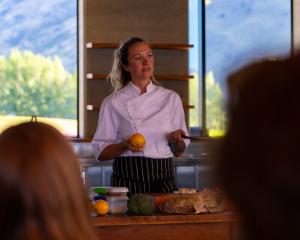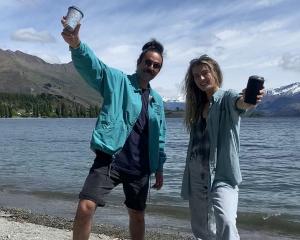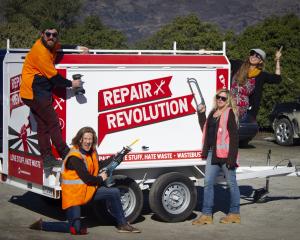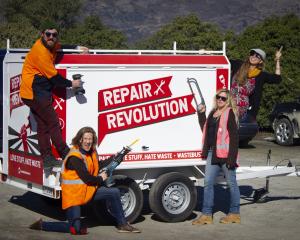

The times are changing in the world of waste. One day at Wastebusters, we were going about our normal business, banging our heads against a brick wall. The next, the wall was crumbling and a crowd had gathered to climb over it.
Last week, we had six visits from businesses, organisations and individuals wanting to reduce their waste and be more resourceful. We're no longer spending our time trying to convince people to tackle waste; we're spending it helping people who want to know how. To have those conversations, it's helpful to have a language to describe the low carbon, zero-waste economy that we're trying to get to.
In my last column I talked briefly about a circular economy. The Ellen MacArthur Foundation has spent nearly a decade working on an alternative to the make-use-dispose economic model that is putting so much pressure on the earth. The circular economy describes a regenerative economic system, in which there is no waste. All resources are kept in use for as long as possible before being recaptured through quality recycling or composting systems.
The current make-use-dispose model has locked us into growth based on resource depletion. And we've been really good at all the parts of that model. Companies make more things than we ever dreamed we'd need or want. Advertising has convinced us that more stuff will make us all happier. And at the end of the stuff's life, which for packaging can be as short as a few minutes, we throw it away.

The circular economy is revolutionary because it hooks us into an infinite loop of resource use. Materials and products are maintained, repaired, reused, refurbished and eventually recycled. Because resources are always brought back into the production system, waste no longer exists. For many years, Wastebusters has advocated for zero waste. The circular economy gives us a language to describe how to get there.
The circular economy is based on three principles (and is underpinned by a shift to renewable energy):
• Design out waste and pollution
• Keep products and materials in use (as illustrated above)
• Regenerate natural systems.
Materials are split into two cycles: technical and biological. Biological is anything to do with food, plants, animals or other biologically-based materials. Materials in the biological loop are returned to natural systems through composting or anaerobic digesters. Materials in the technical cycle are designed to be used as long as possible in their current form (through maintenance, repair, reuse and refurbishment), and then finally are recycled.
Dividing materials into the technical and biological cycle makes a lot of sense. It can help businesses weigh up their choices more clearly. If you're running an event for example, one option for food stalls is to use compostable take-away containers. They are part of the biological cycle, which would make sense because your empty containers will have some food left on them. Since food is part of the biological cycle, that won't cause any contamination issues.

One of the fundamental drivers of change in a circular economy is that companies base decisions on the whole life-cycle of the product. They design their products for longevity, upgrading, repair and recycling. It's fundamentally different from the make-use-dispose model, which doesn't encourage producers to take responsibility past selling the product. In fact, under our current system it makes financial sense to build in planned obsolescence and shorter life spans that force customers to turn over products rapidly.
A circular economy will need innovative new ways of doing business. Some companies are experimenting with leasing services, instead of selling their products. Philips has done a pilot project in Amsterdam supplying "light" instead of light bulbs, to design out overcapacity. Mud jeans, also in the Netherlands, offer a lease, repair and take-back programme for their jeans after a year. They use any unrepairable jeans as recycled content, which makes up 40% of their jeans. By keeping ownership of the product, it's easier for companies to close the loop for recycling and to profit from longer life-cycles. There's also the sharing economy, like car-sharing platform Yourdrive, which brings underutilised resources into the market place.
The benefits of the circular economy are not just environmental, but economic. A report released last month by the Sustainable Business Network (SBN) found that Auckland will be $8.8billion better off each year by 2030 if it makes the shift to a circular economy. SBN says that each year developed economies are using three to four times the amount of resources that are sustainable in the long term. "The circular economy is inevitable. It is the only viable model with which we can successfully meet the needs of a growing population on a planet within our planetary boundaries."
It's exciting, but let's not fool ourselves that switching the tracks our economy runs on will happen by itself. We need to take quick action to make sure the train heads out in the right direction by:
• increasing the waste levy
• introducing a container refund system for bottles and drink cans
• moving away from co-mingled recycling to systems focused on quality.
If you're still with me, there's one last thing. It's a bit unclear how reduction, the cornerstone of zero waste, fits into the circular economy. There's potential to justify single-use packaging within a circular economy if you can funnel it into the recycling system. Recycling is only a solution if producers are connected into the recycling system (e.g through a container refund scheme) and choose materials valuable to recyclers e.g. PET bottles. In many cases of disposable packaging, e.g plastic bags, the solution is to switch to reusable options, or choose no packaging at all. Otherwise we're using a new language to justify business as usual.
For more about the circular economy:
• Case-studies and in-depth analysis at www.ellenmacarthurfoundation.org
• SBN report: "The Circular Economy Opportunity for Auckland" www.sustainable.org.nz
• Circular Economy Summit Aotearoa, August 29, Auckland. www.circulareconomy.org.nz
Gina Dempster is communications officer at Wanaka Wastebusters. Each week in this column, one of a panel of writers addresses issues of sustainability.












